
Nesis III User’s Manual
3.11
Screen Elements
has several markings as you can see on Figure 18.
1
2
9
3
8
4
5
7
6
10
Figure 18:
An airspeed indicator example optimized for an aeroplane using
two step landing flaps.
The markings on the figure have the following meanings:
1
○
IAS (indicated airspeed) is presented by a needle, which starts at centre
and ends at scale markings.
2
○
TAS (true airspeed) is shown as a number inside the window.
3
○
The white range is the normal range of operating speeds for the aircraft
with flaps extended as for landing or take off. Depending on the aircraft,
the white range may have additional upper speed limits, which are based
on flap extension step. See also V
FE1
and V
FE2
. The white range in a
helicopter may be used for the autoration optimal speed.
4
○
The green range is the normal range of operating speeds for the aircraft
without extended flaps. The lower limit of the green range is also re-
ferred to as V
S
– stall speed or minimum steady flight speed at which
the aircraft is still controllable. The upper limit is also referred to as
V
NO
– maximum structural cruising speed.
5
○
The yellow range is the range in which the aircraft may be operated in
smooth air, and then only with caution to avoid abrupt control move-
ment.
40
©
Kanardia
2018-2022












































